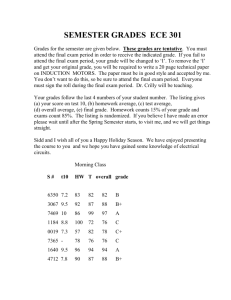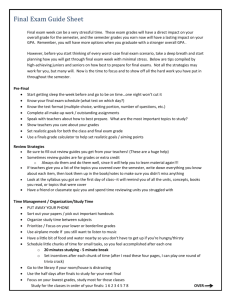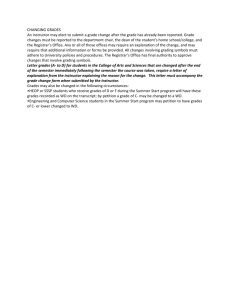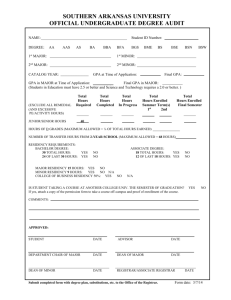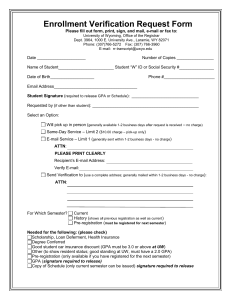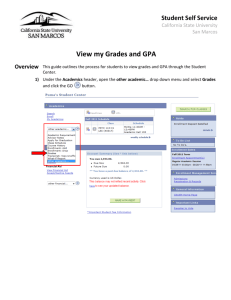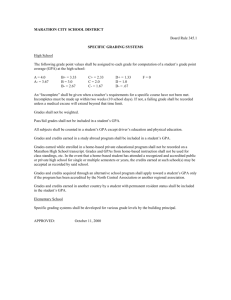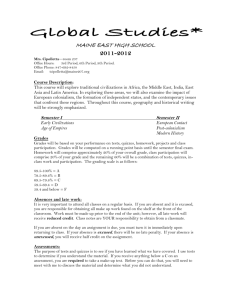UNC Charlotte Academic Policy and Procedure: Grading
advertisement
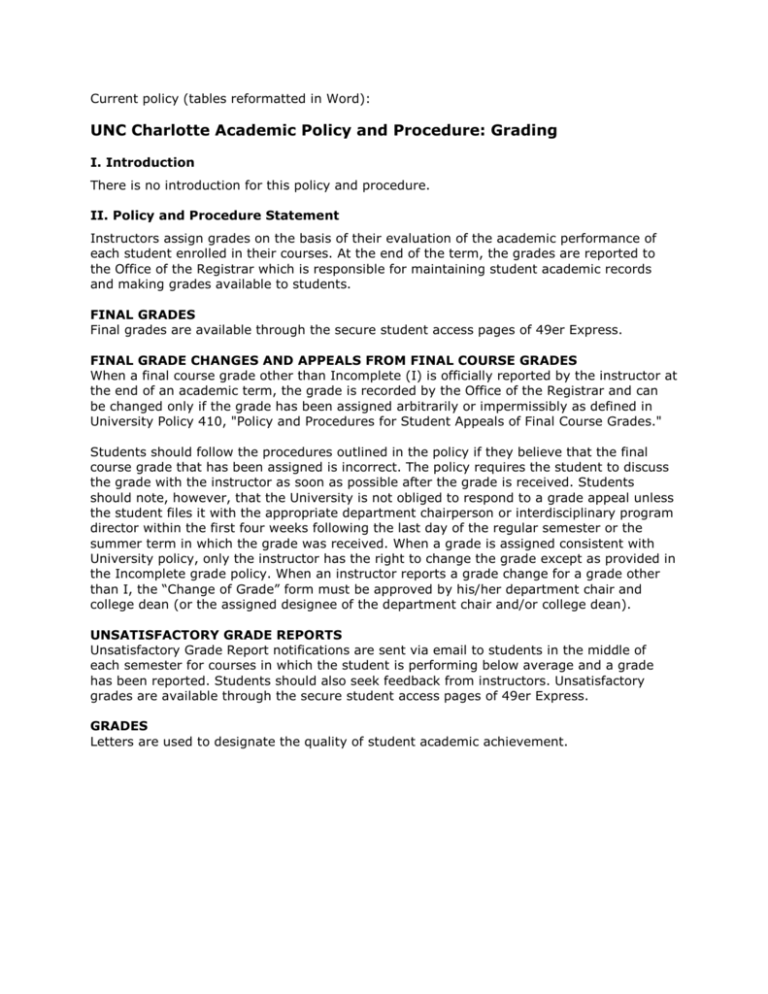
Current policy (tables reformatted in Word): UNC Charlotte Academic Policy and Procedure: Grading I. Introduction There is no introduction for this policy and procedure. II. Policy and Procedure Statement Instructors assign grades on the basis of their evaluation of the academic performance of each student enrolled in their courses. At the end of the term, the grades are reported to the Office of the Registrar which is responsible for maintaining student academic records and making grades available to students. FINAL GRADES Final grades are available through the secure student access pages of 49er Express. FINAL GRADE CHANGES AND APPEALS FROM FINAL COURSE GRADES When a final course grade other than Incomplete (I) is officially reported by the instructor at the end of an academic term, the grade is recorded by the Office of the Registrar and can be changed only if the grade has been assigned arbitrarily or impermissibly as defined in University Policy 410, "Policy and Procedures for Student Appeals of Final Course Grades." Students should follow the procedures outlined in the policy if they believe that the final course grade that has been assigned is incorrect. The policy requires the student to discuss the grade with the instructor as soon as possible after the grade is received. Students should note, however, that the University is not obliged to respond to a grade appeal unless the student files it with the appropriate department chairperson or interdisciplinary program director within the first four weeks following the last day of the regular semester or the summer term in which the grade was received. When a grade is assigned consistent with University policy, only the instructor has the right to change the grade except as provided in the Incomplete grade policy. When an instructor reports a grade change for a grade other than I, the “Change of Grade” form must be approved by his/her department chair and college dean (or the assigned designee of the department chair and/or college dean). UNSATISFACTORY GRADE REPORTS Unsatisfactory Grade Report notifications are sent via email to students in the middle of each semester for courses in which the student is performing below average and a grade has been reported. Students should also seek feedback from instructors. Unsatisfactory grades are available through the secure student access pages of 49er Express. GRADES Letters are used to designate the quality of student academic achievement. Undergraduate Grades Letter A B C D F I IP W WE AU NR Meaning Excellent Good Fair Passing Failing Incomplete In Progress Withdrawal Withdrawal (Extenuating Circumstances) Audit No recognition given for audit Grade points per semester hour 4 3 2 1 0 * * * * * * Cooperative Education S Satisfactory U Unsatisfactory * * Pass/No Credit H P N * * * Honors Passing No Credit * Not used in computation of grade point average. GRADE OF I (INCOMPLETE) The grade of I is assigned at the discretion of the instructor when a student who is otherwise passing has not, due to circumstances beyond his/her control, completed all the work in the course. The missing work must be completed by the deadline specified by the instructor, and no later than 12 months. If the I is not removed during the specified time, a grade of F, U, or N, as appropriate is automatically assigned. The grade of I cannot be removed by enrolling again in the same course, and students should not re-enroll in a course in which they have been assigned the grade of I. GRADE OF IP (IN PROGRESS) The grade of IP is based on coursework for courses that extend over more than one semester. For example, a course that requires enrollment for two consecutive semesters would be eligible for an IP grade in the first term (i.e., Undergraduate Senior Project). A grade of IP should not be given for coursework to be completed in one given term. It cannot be substituted for a grade of I. The IP grade expires after six years, and if no final grade has been awarded by that time, the IP grade will default to a grade of N (no credit). GRADE OF W (WITHDRAWAL) No grade will be given for a course dropped on or before the last day to drop a course without record. After this period, a student may only withdraw from a course in accordance with the conditions and deadlines in the Withdrawals policy. Students who withdraw without extenuating circumstances will receive a grade of W, and are allowed no more than 16 credit hours of W grades over their academic careers. Students who withdraw under formally recognized extenuating circumstances will receive a grade of WE, indicating that the withdrawn hours do not count against the student’s W-limit hours. Post-deadline withdrawal is only allowable for recognized extenuating circumstances. is permitted to withdraw from a course with a grade of W through the tenth week of the semester (9th calendar day of first and second summer sessions). Only students who experience a personal or medical crisis have the option of requesting a withdrawal from all courses after the period defined in the Academic Calendar. This request must be made through the Dean of Students Office during the term of the personal or medical crisis. Unsatisfactory academic performance itself is not an extenuating circumstance. The date of withdrawal is determined when the “Withdrawal” notification is received by the Office of the Registrar. The grade of W or WE is posted on the academic transcript. PASS/NO CREDIT OPTION Every student will be permitted during his/her undergraduate years to select up to a total of four courses (at most one per academic year) in which he/she can receive an evaluation of H (honors), P (pass), or N (no credit). This option is designed to encourage curiosity, exploration, and experimentation in areas where a student has strong interest but little or no previous experience. The Pass/No Credit option only applies to courses normally graded on an A-F scale, and it cannot be used on courses taken by a student for credit toward his/her major or minor or to satisfy University General Education requirements. [Note: courses designated by the faculty to be graded on a Pass/No Credit basis may count for the major.] To exercise this option, the student must declare his/her intention to take a Pass/No Credit option by completing the appropriate form at the Office of the Registrar by the end of the eighth instructional day in the semester; this form requires the approval of the chair of the student’s major department. Courses completed with the grade of Honors or Pass will count toward the hours needed for graduation, but they will not be considered in the computation of the grade point average. REPEATING COURSES A student may receive credit for a course one time only, unless the course description specifies that it “may be repeated for credit.” However, students can repeat a course to improve their GPA under two different sets of conditions. In the first case, within the limits specified in the next section, a student may replace a grade. This process is called “With Grade Replacement.” In the second case, a student may repeat a course with the new grade averaging in with all others for this same course. This is specified in the second section below as “Without Grade Replacement.” With Grade Replacement Undergraduate students may replace up to two (2) courses (maximum of 8 credit hours) for grade replacement. Both grades will be reflected on the transcript. However, the higher of the two grades will be used in calculation of the GPA. This policy applies to courses first taken in Fall 2007 and thereafter. [Note: Some courses in the College of Health and Human Services may not allow grade replacement.] All courses for which a grade of A, B, C, D, or F may be assigned are eligible for grade replacement under this policy. The course to be replaced and the repeat course must have their grades assigned by UNC Charlotte. Students must submit a completed “Grade Replacement” online form through Banner Self-Service by the last day to drop a course with no record in the semester or summer session in which the course is to be repeated. A repeated course may not be selected retroactively to use this grade replacement policy. In courses for which the final grade assigned was a D or F, the student may submit the “Grade Replacement” online form requiring no further approval, providing it is within the course and hour limits specified in this policy. In courses for which the final grade assigned was a C or above, the student must submit the online form that will be routed electronically to obtain approval of the department chair and the dean of the college of the student’s program or major, and remain within the two-course, eight-hour limitations of this policy. Once a student has filed a “Grade Replacement” form for a course that choice cannot be revoked due to withdrawing from the course or from the University. (Medical or special circumstances may be reviewed on a case-by-case basis.) The original course grade will be the grade of record for the course and not a W. Any such withdrawal still consumes one of the two course substitutions permitted under this policy. Students enrolled in special topics courses for a grade replacement must enroll in the same topic for which they originally received the grade to be replaced. A grade received owing to an admitted or adjudicated academic dishonesty violation shall not be replaced if the course is repeated. This exception is not subject to appeal or academic petition. Without Grade Replacement In all courses which are not identified as being repeatable for additional credits, a student who has received a grade of C, H, P, or above in a course may repeat that course only with prior approval of the student’s advisor, department chair, and dean. Students seek approval by completing an “Academic Petition” form or via Banner Self Service. An undergraduate student who received a D, F, or U in a course may repeat a course without seeking outside approval. All grades for repeated courses will be shown on the student’s official transcript and be used in the calculation of the grade point average. For prerequisite purposes, the most recent grade will be used whether or not it is the highest. CREDIT HOURS Credit hours, also known as semester hours, are the number of hours the course is allocated. The majority of undergraduate courses have three (3) credit hours, while labs and other courses may have one, two, four, or more credit hours. Attempted, passed, and earned credit hours are reported on transcripts. Refer to example below. QUALITY POINTS Quality points, also known as grade points, are determined by multiplying the number of points assigned to each grade (A = 4, B = 3, C = 2, D = 1, F = 0) by the number of credit hours associated with that course. Refer to example below. GPA HOURS GPA hours, also known as quality hours, are the total number of credit (semester) hours in the graded courses the student has attempted, except for those for which a grade of I, IP, W, P, AU, or N is recorded. Refer to example below. GRADE POINT AVERAGE (GPA) The grade point average for an undergraduate student is determined by adding all accumulated quality points together, and then dividing by the total number of GPA hours the student has attempted, excluding those for which the student received a grade of I, IP, W, H, P, AU, or N. In computing the grade point average, only those credits attempted at UNC Charlotte or through the Charlotte Area Educational Consortium are included. Refer to the example below. Example of Transcript: Subject Course Grade AMST CHEM CHEM ENGL ENGR LBST MATH 2050 1251 1251L 1101 1201 2101 1241 P F F B C C C Credit Hours 3.000 3.000 1.000 3.000 2.000 3.000 3.000 Quality Points 0.00 0.00 0.00 9.00 4.00 6.00 6.00 Term Totals (Undergraduate) Current Term Cumulative Attempt Hours 18.000 18.000 Passed Hours 14.000 14.000 Earned Hours 14.000 14.000 GPA Hours 15.000 15.000 Quality Points 25.00 25.00 GPA 1.667 1.667 Example of GPA Calculation: GPA = Quality Points/GPA Hours; 25/15=1.667 GRADE POINT CALCULATOR To calculate grades, visit http://registrar.uncc.edu/gpa-calculator. III. Definitions • • • • 49er Express – One-stop shopping for student services via the Web. It combines various systems, user interfaces, and technical solutions already available to the UNC Charlotte community in a single, consistent web-based interface. Students should use 49er Express to access web-enabled student services, course information, e-mail, and calendar scheduling. Department chair – The faculty member in charge of an academic department of the University. GPA (Grade Point Average) – A system of recording academic achievement based on an average of a student's grades. The student’s semester GPA is an average of grade points earned during that semester, ranging from 0.0 to 4.0. Cumulative GPA is an average of all grade points earned in a certain degree program or university. Registrar – The official at the University who is responsible for maintaining student records. The Office of the Registrar plans and oversees registration, academic record maintenance, transcript preparation, graduation, a degree audit report system, and curricular records. IV. Policy and Procedure Contact(s) • • • Authority: Faculty Council [Faculty Academic Policy and Standards Committee] Responsible Office: Office of the Provost and Vice Chancellor for Academic Affairs Additional Contact(s): Office of the Registrar V. History • • • Revised: September 26, 2013 [inclusion of assigned designee of the department chair and/or college dean for approvals of final grade changes] Revised: November 2, 1989 Approved: December 6, 1967 VI. Related Policies, Procedures, and Resources • • • • • • • • 49er Express Academic Petition Form Final Grading Instructions Grade Point Calculator Policy and Procedures for Student Appeals of Final Course Grades Request for Review of a Final Course Grade Guidelines for Students Repeat Course Overrides Satisfactory Academic Progress VII. Frequently Asked Questions • • Which students are covered under this policy and procedure? This policy and procedure applies to all undergraduate students at UNC Charlotte. If a student drops a course that has been designated “with grade replacement” within the designated add/drop period, does the student forfeit that grade replacement? No, if a student is registered for a repeated course that they are taking with grade replacement and drop that course within the appropriate add/drop period with no penalty, they do not lose their grade replacement and can use it again in the future, should they desire. However, if a student withdraws from the course (after the add/drop period), the grade replacement is considered used.
